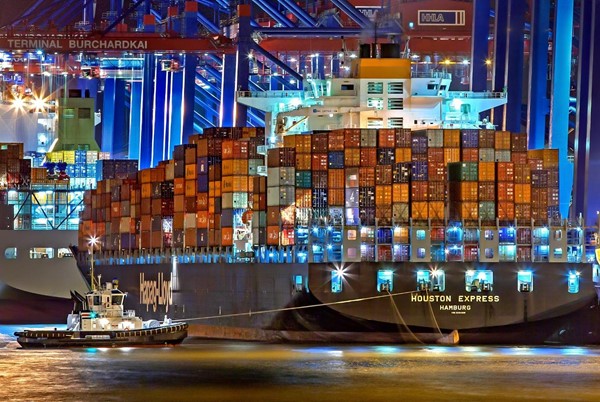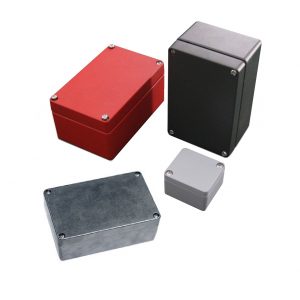



When you are selecting your enclosure, choosing the correct material should be one of the first considerations. Your enclosures primary purpose is to provide sufficient protection for your electronics, selecting a material that does not meet the needs of the project can lead to degradation of the enclosure and ultimately expensive repairs or complete failure of your electronics. Plastics and metals are the main options available, with each material having its own strengths and weaknesses. Spending the time to evaluate your product and application environment first is a key step, if the enclosure is to be situated outdoors and exposed to harsh weather and impact such as the deck of a ship you should consider a tough, rugged material to ensure the best function and long enclosure life. Enclosures for internal applications particularly around the home or office are not likely to need the same level protection and perhaps a material that can be easily customised to suit the surroundings should be considered.

Plastic has many great properties, including high impact resistance and excellent corrosion resistance. Depending on the application it is likely your product will experience some kind of impact whether it’s the user dropping their handheld equipment or a vandal striking your cabinet enclosure, selecting impact-resistant material will provide the best protection for your electronics. Exposure to corrosion is typically less common compared to impact and will be most prominent in areas such as food preparation where the material will be cleaned with water and chemical washdowns to prevent bacteria. You should take the time to study the environment and the potential for chemical exposure so a material with sufficient corrosion resistance can be selected. Typically, plastic enclosures are lightweight making them easy to wall mount and compared to metal equivalents they are the most cost-effective option. The most common plastic enclosure materials include ABS and polycarbonate.
ABS is a copolymer deriving from Acrylonitrile, Butadiene latex and Styrene, the content levels of each can be adjusted to enhance the characteristics of the material including improving impact strength, rigidity and protection against acidic and alkali chemicals. The presence of Acrylonitrile means the material has excellent temperature resistance and can be moulded to achieve UL94 V-0 flammability rating. The base material is best suited for indoor applications as long exposure to sunlight can lead to the material becoming slightly discoloured, however, UV stabilizers can be added to prevent this. This versatility of ABS during the moulding process has seen it become a preferred material in many industries, including electronic components, personal computers, communication facilities and automotive parts.
Polycarbonate like ABS is tough and can withstand impact, temperatures between -40 °C to +120 °C and the base material, unlike ABS, has excellent UV properties meaning it is ideal to use in external applications for long periods of time. Polycarbonate provides corrosion resistance in acidic environments, however, is not suitable for surroundings with strong alkali presence.
Both ABS and polycarbonate material are easily customisable to create bespoke options, custom colours can be easily achieved by specifying your chosen RAL or Pantone colour to the manufacturer. Once the enclosure is moulded connections and cable entry cutouts can be added using CNC machining.

Metal enclosures are typically chosen for their industrial qualities such as strength, durability and natural ability to withstand high ambient temperatures.
Robust construction means diecast aluminium enclosures are best suited for industrial applications where the impact from tools or vehicles is a risk. Aluminium material has low electrical conductivity properties and excellent resistance to magnetic force which help to shield against RFI (radio frequency interference) and EMF (electromagnetic frequency), equivalent plastic enclosures would require RFI/EMI shielding to achieve the same level of base protection.
Stainless Steel enclosures are ideal for use in food, medical and marine applications thanks to their corrosion-resistant and sanitary properties. These environments expose products to harsh chemicals, regular wash downs and saltwater which can all lead to a material deterioration in lesser quality materials and ultimately ruin the integrity of your enclosure and electronics.
Extruded aluminium enclosures whilst not as strong as diecast models show their strengths with the customisation options available. The material is easy to machine allowing the customer to add many custom apertures and the length of the extrusion can be custom cut meaning small runs of bespoke enclosures are easily achieved. Anodising allows the customer to further modify the standard ranges, adding their company colours and laser printing/etching services are available to complete the enclosures with your branding.

Choosing the right material is only one factor to consider when selecting an enclosure product, if you identify the application is external you should take time to research IP ratings too. The term IP rating (ingress protection) is used to determine an enclosures degree of protection against the intrusion of solid objects and liquid. The ratings are made up of two numbers, the first ranging from 1-6 represents protection against objects and the second ranging from 1-9 is protection against liquids. These figures are then combined to show the user the rating ie. IP65 will provide complete protection against dust and with limited ingress permitted, protection from jets of water.
In conclusion, there are many factors concerning the material selection that should be considered when you begin your search for an enclosure product. Spending this time in the early stages of development will ensure the long life of your enclosure product and provide the best possible protection for your electronics. If you are struggling to figure out which material is the most suitable for your enclosure, give us a call on 01908 325100 of fill in this contact form.